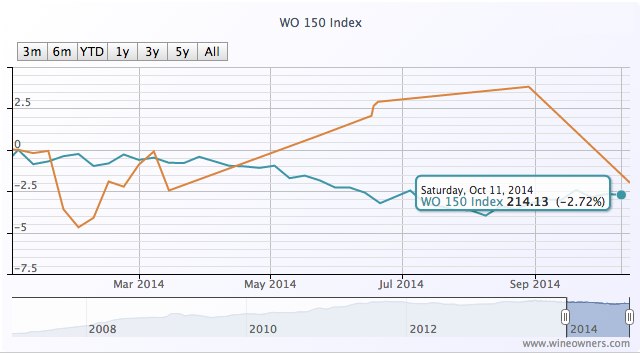by Wine Owners
Posted on 2016-03-23
With the base price taken on January 2008, the WO Bordeaux Index has significantly outperformed the Dow Jones Index, peaking at 147.33% as of 17 March, 2016, dwarfing Dow Jones' seemingly modest gains of 40.40%. With growing demand for Bordeaux market within the Asian market, such inflation in prices is undoubtedly set to increase. The WO Bordeaux Index's ability to weather through financial instability is also illustrated in its appreciation in the midst of the 2008-2009 financial crisis, obtaining a 74.73% increase compared to Dow Jones' depreciation of 43.60%.

Note: The Dow Jones Industrial index (DJIA) is a price-weighted average of 30 significant stocks traded on the New York Stock Exchange and the Nasdaq.
by Wine Owners
Posted on 2015-02-16
The turning point for fine Bordeaux was August of last year. By early October it was unclear whether the tick-up was yet another of those blips we’d seen several of during the previous 24 months.
Today it is clearer: the trend is up, most wines are well off their lows, and the Bordeaux Index overall is 2.17% up on 6 months ago.
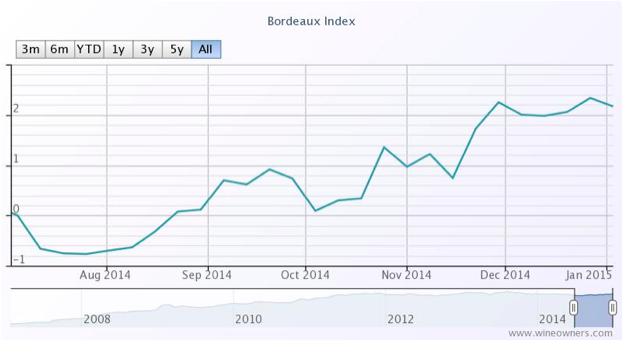
The exception is the Libournais index covering Pomerol and St Emilion, which has slipped 0.48%, a reversing the gains of 1.24% between early October and the end of November last year.
The Medoc Classed Growths are collectively up 2.77% form their August 9th 2014 lows.
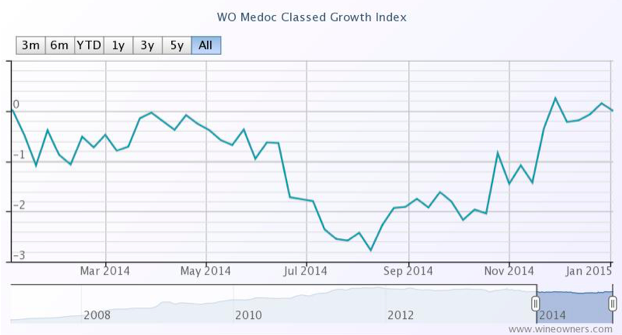
Whereas the First Growths only managed 1.51% during the same period. Not entirely surprising since top vintages are still highly priced, they have had further to fall, making it hard to call bottom, and started picking up momentum in January 2015. What is clearer is that wines such as Haut Brion 2008 appear to be interesting propositions.
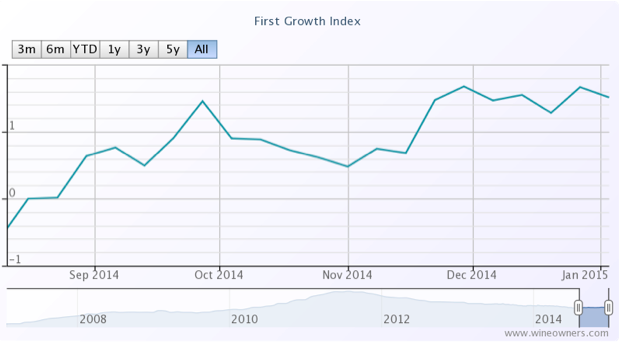
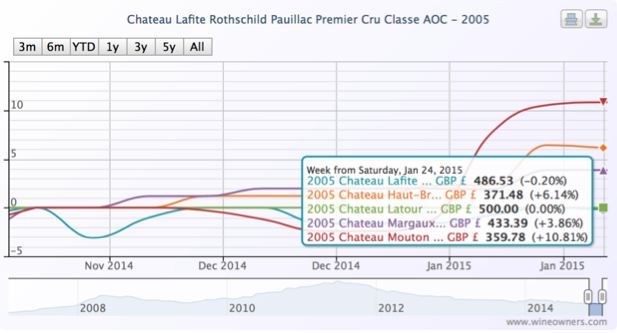
Elsewhere the Blue Chip Burgundy Index continues to power ahead, though within that there are notable, and expensive, fallers (last 12 months):
| Domaine de la Romanee-Conti Le Montrachet Grand Cru AOC |
2010 |
-7.16 |
| Domaine Ponsot Charmes Chambertin Cuvee des Merles Grand Cru AOP |
2010 |
-7.69 |
| Domaine Armand Rousseau Mazis-Chambertin Grand Cru AOC |
2010 |
-7.89 |
| Domaine Jean Grivot Richebourg Grand Cru AOC |
2007 |
-9.43 |
| Domaine de la Romanee-Conti Romanee Saint Vivant Grand Cru AOC |
2010 |
-10.71 |
| Domaine Jean Grivot Echezeaux Grand Cru AOC |
2002 |
-11.2 |
| Domaine Leflaive Batard-Montrachet Grand Cru AOC |
2006 |
-13.15 |
| Sylvain Cathiard Vosne Romanee En Orveaux Premier Cru AOC |
2010 |
-13.69 |
| Domaine Comte Georges de Vogue Chambolle Musigny Les Amoureuses Premier Cru AOC |
2002 |
-13.7 |
| Domaine de la Romanee-Conti La Tache Monopole Grand Cru AOC |
2010 |
-15.38 |
| Domaine Armand Rousseau Clos de la Roche Grand Cru AOC |
2010 |
-16.08 |
| Domaine Leflaive Batard-Montrachet Grand Cru AOC |
2005 |
-16.18 |
| Domaine Jean-Francois Coche-Dury Corton-Charlemagne Grand Cru AOC |
2006 |
-16.35 |
| Domaine Leflaive Chevalier-Montrachet Grand Cru AOC |
2005 |
-16.67 |
| Domaine Leflaive Le Montrachet Grand Cru AOC |
2008 |
-20 |
| Domaine Leflaive Le Montrachet Grand Cru AOC |
2006 |
-20.16 |
| Domaine Leflaive Le Montrachet Grand Cru AOC |
2005 |
-21.94 |
Northern Italy is up 1.42%, with Giacomo Conterno one again heading the leaderboard
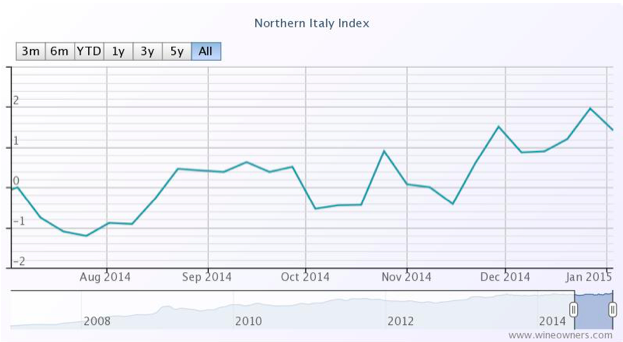
Champagne has defied our predictions in gaining a whopping 7.42% over the last 6 months, the top risers comprising exclusively older vintages in the range 1996-2002. This makes a lot of sense. Millions of bottles of top cuvees such as Dom Perignon (up to 8M bottles per annum) means that values kick up only when supply and demand becomes more balanced.
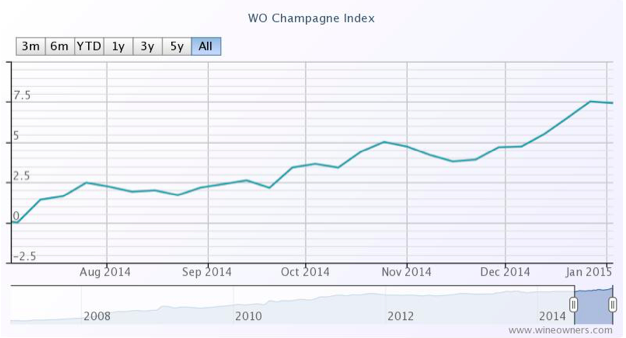
We also thought Californian wines would moderate their growth this year. Comparative to Bordeaux prices, they seem expensive. Since January they have indeed dipped -0.65%, off the back of six month growth of 6.65% up until that point. It’s too early to say whether they are simply pausing for breath, or have reached a natural plateau. The trend line favours the first scenario.
by Wine Owners
Posted on 2014-10-17
Treasure assets are uncorrelated. That’s part of the attraction to high net worth individuals (HNWIs) looking for suitable stores of value.
I use the phrase store of value purposefully. Wealth preservation and enjoyment of the fruits of success are arguably far more important to HNWIs than specific targeted annual returns.
Wine has appeared deeply uncorrelated since the financial crisis of 2008. The facts bear that out. Yet we mustn’t forget the power of externalities to distort underlying tendencies; such as insatiable demand from China up until mid-2011, or the flight from traditional financial instruments during periods of extreme market stress into all things tangible. It’s easy to forget that the wine market did suffer during previous economic recessions or shocks, whether the recession of the early 1990s or the Asian financial crisis of 1997.
Yes, of course we’re talking principally about Bordeaux, that behemoth of a region that produces unrivalled oodles of fine red wine. Paradoxically other regions of production may indeed be uncorrelated with Classed Growth Bordeaux as hot wine money searches for relative value, or where scarcity creates a rather different drumbeat.
With the current financial market turmoil; the sudden reawakening to the woes of Europe; the economic and political uncertainty of its recession-hit member states - what better moment to analyse the question of market correlation?
The wine market became quite excited by a small upturn that started in late July, continued during August and through much of September. A month on, and things aren’t quite so clear-cut, but in spite of plummeting stock markets, wine prices are not following suit.
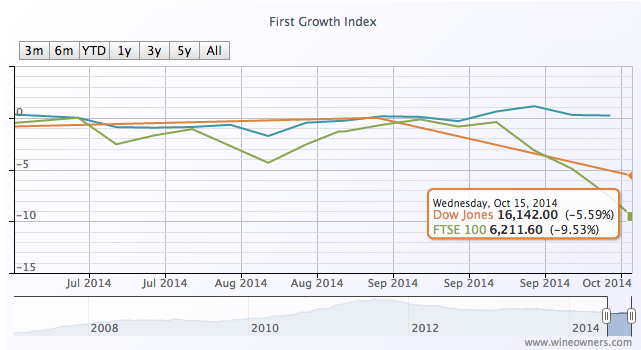
The First Growth Index is up by 1.2% over the last 3 months whilst the FTSE has dived almost 8% - that’s roughly the same amount of value destruction as the First Growths experienced over the previous 12 months. The Bordeaux Index has followed the same positive (if tentative) trajectory (comprising Medoc and Graves Classed Growths and the top Libournais benchmarks). So has Northern Italy, only a whisker off its all-time highs, along with blue chip Burgundy and the effervescent Champagne market.
After a disappointing year so far for the wine market overall (represented by the WO 150 Index), the previously run-away Dow is within single-digit, fingertip distance of fine wine’s -2.7% fall.
